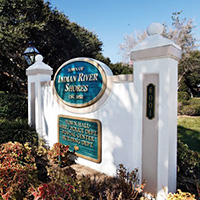 Appeals court denies Shores’ rehearing bid
Appeals court denies Shores’ rehearing bid
STORY BY LISA ZAHNER (Week of July 20, 2023)
The Fourth District Court of Appeals has rejected a request by Indian River Shores for a rehearing of an appeal of the town’s breach of contract lawsuit against the City of Vero Beach, but the legal battle is likely not over.
Indian River Shores still believes the town has a good case in its claim that Vero unjustly reneged on a 2012 water-sewer utility franchise agreement. But at this point, the case can only be resolved by the Florida Supreme Court – if the town’s legal team can convince the state’s court of last resort to take up the case.
“I fully expect the (town) council to authorize the seeking of certiorari from the Florida Supreme Court, to exhaust all of our legal options,” Mayor Brian Foley said Monday.
Should the Florida Supreme Court agree that it has jurisdiction, it would send a Writ of Certiorary to the appeals court asking that the 4th DCA prepare the case and send it up to Tallahassee.
What may entice Florida’s top judges to hear the Shores’ case is a chance to affirm one of the high court’s own rulings from 1955. Here’s how the present case and the 1955 case are similar.
In 2012, Indian River Shores’ water-sewer utility franchise agreement with the City of Vero Beach, signed in the 1980s, was coming up for renewal, so the town sought proposals to obtain the best utility deal for the next 15 or 30 years. Both Vero Beach Utilities and Indian River County Utilities made presentations to the Town Council, which at the time was led by Mayor Tom Cadden.
Vero and the Shores had a long history, but Indian River County was offering better utility rates for many residents. The county’s reuse irrigation rates were especially attractive because the town relies heavily on reuse water to keep its lush lawns, landscaping and golf courses green. Plus, town officials generally agreed that county’s leadership would maintain more stable, lower rates than Vero through disciplined fiscal management.
The political backdrop to that assumption, and to a distrust that Vero would keep its rates low, was the ongoing battle at the time over efforts to sell Vero Electric to Florida Power & Light after Vero’s rates soared in 2009.
Those trying to block the sale of Vero Electric did not want to give up the millions of dollars the city siphoned off the utility to keep Vero property taxes low. And as was the case with the electric utility, Vero also transferred millions from its water-sewer utility into the general fund as well. Shores officials viewed – and continue to view – this practice as unfair.
A grassroots effort to convince Vero to merge its water-sewer utility with the county utility was rejected by Vero in large part because the city relied heavily on these profits.
But then-Vero Beach City Manager Jim O’Connor and the council members he answered to did not want to lose Indian River Shores as water utility customers. So O’Connor pledged to Cadden that the city would match Indian River County Utilities’ published rates for Indian River Shores, including the all-important reuse irrigation water rate.
That deal was memorialized in a utility franchise agreement, which was approved and executed by both parties in October 2012. Shores customers were switched to Indian River County rates, and the rate charged for reuse irrigation water dropped dramatically, saving residents and homeowner associations hundreds of thousands of dollars each year.
Then in 2019, the Indian River County Commission reduced reuse irrigation rates from 67 cents per 1,000 gallons to 21 cents per 1,000 gallons.
After seven years of matching county rates for the Shores, Vero Beach did not reduce Shores’ customers’ reuse rates to match these new lower rates.
Indian River Shores sued for breach of contract and lost in circuit court. Judge Janet Croom agreed with Vero’s application of state statute, which gives the city the power to set its own rates, charges and fees. Croom also agreed with Vero that the city could not subsidize lower rates for Shores’ customers with the higher rates needed from other customers to cover costs.
The Shores then lost in appeals court. On July 9, the town requested a rehearing of the appeal so it could get “clarification” on the 4th DCA’s ruling because the legal issues involved, the town claimed, are a matter of great public importance.
Municipalities all over Florida rely on utility franchise agreements, so the Shores contended the ruling could have broad consequences.
In 1905, the City of Gainesville wanted the University of Florida to build its main college campus in Gainesville. Gainesville not only donated land, but promised the University of Florida, in a written agreement, free water service to school buildings. At the time, UF had 135 students.
By 1950, the Gator Nation had grown to more than 11,000 students and the elected officials of Gainesville decided the city could no longer afford to give free water service to every building on the sprawling UF campus.
In October 1950, Gainesville began sending water bills to the college. UF refused to pay and the parties landed in court. Gainesville argued that in 1948 and 1949, it had made huge capital investments to serve the growing needs of the university and needed to recoup those costs.
The case ended up at the Florida Supreme Court, which ruled that the City of Gainesville must honor the 1905 deal to give UF free water service.
The opinion says, “We attach no importance to the phenomenal growth of the university as itself a reason to relieve the city of the burden. From a moral standpoint, it seems to us that the inducement to secure the advantage of a university of one hundred thirty-five students is shown to have been justified by the presence of a university with eleven thousand. So, were we to stop here we would hold that the citizens in 1905 struck an excellent bargain, and that the present size of the institution is all the more reason the city should be held to it.”
Then the court outlined the pertinent legal issues, pointing out that various cities were competing to have the UF headquartered in their locales, and Gainesville used the free water to gain a competitive advantage. The court found it was well within the powers of the city to make such a deal.
“The donation was, in effect, one for the benefit of the State, as well as the city, and was made to agents of the State with apparent sanction of the State. This, of course, would apply to any city offering a similar inducement,” the court said.
The condition of the free water was that the UF campus remained in Gainesville, so the court found that as long as the UF campus remained in Gainesville, the university was legally entitled to free water.
“We find nothing in the record to support the position that the city was bound only to furnish water as long as it could afford it, or until some arbitrary period subsequently to be determined,” the court concluded.
Shores officials are hoping the Florida Supreme Court agrees to hear its current case and sees the commonalities.
Since the breach of contract suit has been filed, Vero has changed its entire rate structure and in January began sending utility bills to town customers with double-digit rate increases.
Vero approved the rate increases in part to cover increased operational costs, but mostly to build up reserves to construct a new wastewater treatment plant on the Vero Beach Regional Airport property. That project is expected to cost in excess of $156 million.
The new plant would open in 2027 or possibly 2028. Indian River Shores’ water-sewer franchise agreement with Vero expires Oct. 1, 2027, and town officials are in talks with county officials to obtain service from Indian River County Utilities, in part because of the recent disputes with Vero over rates.
Town Manager Jim Harpring said negotiations are progressing “now that a county attorney has been named and the new county administrator, John Titkanich, has gotten his feet wet.”



